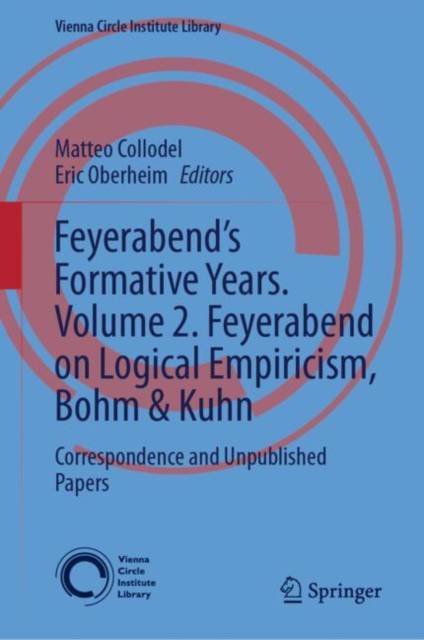
Bedankt voor het vertrouwen het afgelopen jaar! Om jou te bedanken bieden we GRATIS verzending (in België) aan op alles gedurende de hele maand januari.
- Afhalen na 1 uur in een winkel met voorraad
- Gratis thuislevering in België vanaf € 30
- Ruim aanbod met 7 miljoen producten
Bedankt voor het vertrouwen het afgelopen jaar! Om jou te bedanken bieden we GRATIS verzending (in België) aan op alles gedurende de hele maand januari.
- Afhalen na 1 uur in een winkel met voorraad
- Gratis thuislevering in België vanaf € 30
- Ruim aanbod met 7 miljoen producten
Zoeken
Feyerabend's Formative Years. Volume 2. Feyerabend on Logical Empiricism, Bohm & Kuhn
Correspondence and Unpublished Papers
€ 213,95
+ 427 punten
Omschrijving
The authors Matteo Collodel and Eric Oberheim take the reader on a journey through the early life of the famous Austrian philosopher Paul Feyerabend, whose groundbreaking work Against the Method forged new paths in the philosophical understanding of science.
Collodel and Oberheim's book contains the translated correspondence of Feyerabend (1924-1994) with equally influential philosophers and scientists of the time, including Rudolf Carnap, Herbert Feigl, Carl G. Hempel, J.J.C. Smart, David Bohm, and Thomas Kuhn.
This book offers an entirely unique approach to the philosopher Paul Feyerabend. Informative, challenging and profound, it immerses the reader deeply in the mind of a truly revolutionary philosopher of science.
The main focus lies on the explanation of Paul Feyerabend's ideas on logical empiricism and quantum mechanics, which he developed especially in the 1960s. In order to appreciate the celebrated work of the philosopher, it is important to create an understanding of these formative years in Feyerabend's life and work.
Anyone who knows similar discussions, like the paradigm shift of Thomas Kuhn, or has a passion for history, philosophy and science will be fascinated by the works of Paul Feyerabend. As scientists and followers of Feyerabend, Collodel and Oberheim strive to pay respect to the philosopher and to make his work accessible to a whole new generation.
Collodel and Oberheim's book contains the translated correspondence of Feyerabend (1924-1994) with equally influential philosophers and scientists of the time, including Rudolf Carnap, Herbert Feigl, Carl G. Hempel, J.J.C. Smart, David Bohm, and Thomas Kuhn.
This book offers an entirely unique approach to the philosopher Paul Feyerabend. Informative, challenging and profound, it immerses the reader deeply in the mind of a truly revolutionary philosopher of science.
The main focus lies on the explanation of Paul Feyerabend's ideas on logical empiricism and quantum mechanics, which he developed especially in the 1960s. In order to appreciate the celebrated work of the philosopher, it is important to create an understanding of these formative years in Feyerabend's life and work.
Anyone who knows similar discussions, like the paradigm shift of Thomas Kuhn, or has a passion for history, philosophy and science will be fascinated by the works of Paul Feyerabend. As scientists and followers of Feyerabend, Collodel and Oberheim strive to pay respect to the philosopher and to make his work accessible to a whole new generation.
Specificaties
Betrokkenen
- Uitgeverij:
Inhoud
- Aantal bladzijden:
- 359
- Taal:
- Engels
- Reeks:
- Reeksnummer:
- nr. 10
Eigenschappen
- Productcode (EAN):
- 9783031575181
- Verschijningsdatum:
- 28/08/2024
- Uitvoering:
- Hardcover
- Formaat:
- Genaaid
- Afmetingen:
- 156 mm x 234 mm
- Gewicht:
- 693 g

Alleen bij Standaard Boekhandel
+ 427 punten op je klantenkaart van Standaard Boekhandel
Beoordelingen
We publiceren alleen reviews die voldoen aan de voorwaarden voor reviews. Bekijk onze voorwaarden voor reviews.








